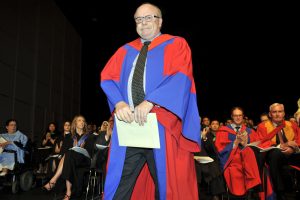
On April 1, 2014, Dr. Darryl Hunter successfully defended his PhD thesis, entitled, “About Average: A Pragmatic Inquiry into School Principals’ Meanings for a Statistical Concept in Instructional Leadership.” While researching, he was awarded several scholarships and fellowships: University of Regina Graduate Scholarships, Dean’s Scholarship Program, SSHRC Doctoral Fellowship, Killam Trust Pre-doctoral Fellowship, Saskatchewan Innovation and Opportunity Scholarship, Jack and John Spencer Middleton Scholarship, League of Saskatchewan Educational Administrators, Directors and Superintendents Award. Since finishing his dissertation he has been awarded the University of Regina President’s Award, the Thomas B. Greenfield Award, and the Governor General’s Academic Gold Medal. Dr. Hunter is now serving as an Assistant professor in Educational Policy Studies at the University of Alberta.
An Interview with Dr. Darryl Hunter
1. Briefly summarize the topic of your research:
I am interested in the manifold ways that school principals-administrators (and adults in general) interpret numeric information in their quotidian practices. My mixed methods dissertation revolved around the ways that Saskatchewan school administrators construe the “average” in the phrase “average student achievement”—the average as both a quality and a quantity.
2. What circumstances/situation led you to research the topic of your dissertation?
Research topics are often inspired by direct experiences which point out the absence/inadequacy of existing theory. From my experience working with educators and policy makers as a civil servant over many years, it was plain to me that mathematics pedagogy and statistical textbooks and cognitive science could not explain the ways that well-educated, conscientious leaders actually reason and behave with numbers in the workplace. Moreover, I was dissatisfied with a massive research literature that makes sweeping, omnibus claims about “data use”, without looking in micro detail at the preliminary reading processes with numbers.
3. How has your research enhanced your professional life?
My dissertation has led me to approach questions of instructional leadership, both by school administrators and by teachers, in very different ways—less coloured by the assumptions that statisticians (as authors) and ideologues (as those who superimpose their ideas on both the author and reader) bring to these inanimate squiggles on a page. What was missing was the perspective of the reader, who wants to/has to make practical sense of things numeric without having the time or background or inclination to accomplish detailed calculations. Now, I start all teaching/research/scholarship/class discussion/lectures with a) a well-formulated question and b) clarity of purpose which seem central to interpreting both prose and numeric text.
4. What aspirations do you have regarding what your research might accomplish in the field of education?
I have several goals: a) to open up the field of numeracy without making impossible demands on the reader, analogous to the way we now foster literacy without demanding that students first become experts in literature b) to point out recognized and influential North American philosophers in education, without continually recycling Eurocentric ideas which originate from socio-educational milieux very different than those surrounding North American schools; b) to foster a better informed, healthier and saner discussion about assessment and evaluation matters in educational and academic circles
5. Was it difficult to achieve your research goals? How did you overcome obstacles (if any), whether personal or professional?
The Faculty of Education at the University of Regina has unfailingly, always flexibly, and often enthusiastically supported my academic excursions into less-explored and sometimes controversial territory. As always in research matters, the primary barriers are insufficient time and over-generalized stereotypes. Over the 18 years I was a public servant, I oscillated (some might say ricocheted) back and forth from daytime positions in the Ministry of Education to evening classes, teaching at the university–that is back and forth between actual administrative practice to the home of theory. My committee members recognized that assessment processes and research methods are complementary, one serving decision-making and the other satisfying curiosity. Both are forms of inquiry, with different audiences.
In many ways, I found my doctoral research to be less onerous than my Master’s thesis–primarily because I could concentrate full time on research. At the same time, I knew what I was looking for before I designed and carried out my research: what is the actual link between thought and action with numbers? My supervisor, Dr. Rod Dolmage, was absolutely committed and key to removing blockages on the road to inquiry.
6. Abstract/Excerpt:
“Whatever else it produces,” Kahneman (2011) has declared, “an organization is a factory that manufactures judgements and decisions” (p. 418). In Canadian schools, thousands of such professional judgements are routinely made during a school year by teachers with direction from school principals—when appraising student performances, when constructing assignments and marking student work, and when preparing reports for multiple audiences. To manage the meaning of these statistics, school administrators consider average student achievement not with the inferential patterns assumed within contemporary cognitive science’s notions of heuristic irrationality, but rather as a reasoned form of inquisitive thinking and behaviour which has been formalized and comprehensively described in North American philosophy for over 100 years. To adequately understand the meaning of the statistical average, we must avoid succumbing to what William James (1890) called the “great snare” of the psychologist’s fallacy: “the confusion of his own standpoint with that of the mental fact about which he is making his report” (p. 290)—superimposing our own categories on those of others.
Committee:
Dr. Rod Dolmage (Supervisor), Dr. Larry Steeves,
Dr. Ron Martin, and
Dr. Katherine Arbuthnott (External Examiner)
